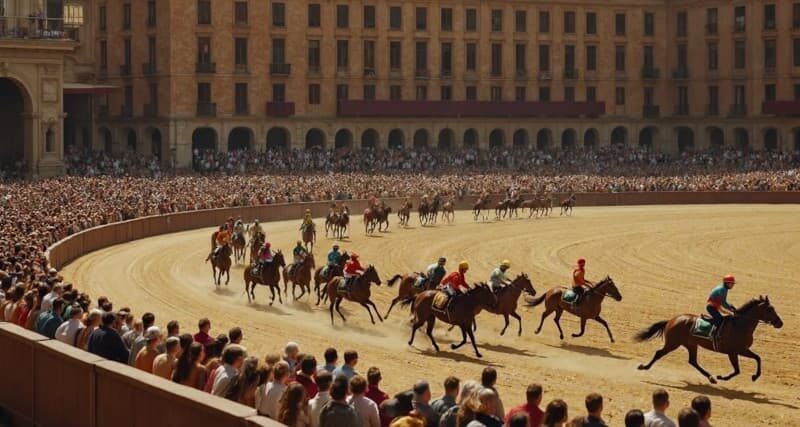Is Horse Racing Profitable or Worth It in 2025?
Horse racing has this nickname — the “Sport of Kings” — and for good reason. Back in the day, it really was a pastime for royalty and nobles who had the money to own and race horses.
Actually the roots go way back to ancient Greece, Rome, and even Egypt, where people were already racing horses and chariots. Fast forward to England in the 12th century, and organized racing started to look more like what we know today. By 1750, the Jockey Club was created to set rules and standardize the sport, which basically shaped modern horse racing.
Today it is an entire business machine. There are breeders, trainers, jockeys, and owners investing fortunes. Add in the racetracks, betting companies, and fans, and you’ve got billions of dollars flowing through the system.
Economic Value and Contribution
When people think of horse racing, they often picture the thrill of the track or the betting slips, but behind all that is a massive economic engine. Globally, the sport pumps billions into economies every year.
Take the U.S., for example — horse racing there fuels about $177 billion in economic activity and supports around 1.4 million jobs. Cross the Atlantic, and in the U.K. it’s worth over £4 billion, employing about 85,000 people. Australia isn’t far behind, with a direct impact of $3.2 billion that jumps to $9.2 billion once you add in all the connected industries, from breeding to tourism. And then there’s Japan, where betting alone generates more than 2.5 trillion yen a year — roughly €15 billion — making it one of the biggest racing markets in the world.
Put together, it’s clear this sport isn’t just about entertainment; it’s a cornerstone for jobs, local economies, and national revenues across multiple countries.
Billionaires Involved in the Horse Racing Business
For most people, horse racing is about placing a bet, watching the track, and maybe winning a little cash. But for a handful of billionaires, it’s on a completely different level. Out of the world’s 1,800-plus billionaires, about 14 are active in the sport, with a combined fortune of over $50 billion. And they’re not just buying horses for fun — they’re running entire operations. Think massive breeding farms, top-class training facilities, racetracks, and global racing events.
In Dubai, Sheikh Mohammed bin Rashid Al Maktoum turned Godolphin Racing into a worldwide powerhouse, while his brother Sheikh Hamdan did the same with Shadwell. Over in Europe, Gerard and Alain Wertheimer — yes, the Chanel brothers — pour serious money into thoroughbred breeding. Kirsten Rausing runs Lanwades Stud in the U.K., raising winners of major international races, while Eva Maria Bucher-Haefner oversees Gestüt Fährhof in Germany, a premier breeding operation. In North America, Frank Stronach and John Malone don’t just own horses; they own racetracks too. Peter Brant of White Birch Farm and Charlotte Weber of Live Oak Plantation are also deeply involved in breeding and racing top thoroughbreds.
For these billionaires, horse racing isn’t just a hobby — it’s a full-blown business. Their investments ripple across the industry, fueling stables, training programs, auctions, and events around the world.
Risks and Challenges

On the surface, horse racing looks like glamour. But the truth is, it’s a tough business with real risks. The costs hit hard right from the start — buying a racehorse, training, and stabling can run into the millions, and even then, the prize money doesn’t always cover the bills. Add in ongoing expenses like feed, vet care, and staff, and it’s clear this isn’t a casual investment.
Performance is another gamble. Horses get injured, fall sick, or simply don’t live up to expectations, no matter how promising their bloodline looks. On top of that, the industry itself is volatile. Prize money, betting revenue, and horse sales shift with the economy and public interest, and global events can shut down racing altogether. Regulations also make things tricky; one new tax or policy can cost the industry millions.
There’s reputation involved. Scandals, doping cases, or concerns about animal welfare can ruin both finances and public trust. Finally, managing stables and competing against top-tier owners requires serious time, effort, and expertise. In short — the rewards are real, but so are the risks.
Bottom Line
By 2025, horse racing is still a massive business — the global market could hit around $523 billion, and betting alone might top $47 billion. But don’t let the flashy numbers fool you. Getting into this game isn’t easy. Costs are huge, competition is fierce, and horses can be unpredictable. Add in regulations, animal welfare concerns, and the ups and downs of the economy, and even experienced owners can take big hits. That said, if you know what you’re doing, plan carefully, and accept the risks, there’s real potential — just remember, this isn’t a get-rich-quick scene. It’s a high-stakes world where patience, knowledge, and strategy matter more than luck.

